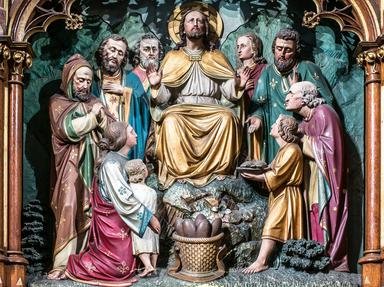Quiz Answer Key and Fun Facts
1. Jehoiakim is the correct orthography (in the NIV and most other English translations I've checked) for the man we would call Joachim in plain English. What was Jehoiakim's profession whenever he is mentioned in the Old Testament?
2. Joseph is a name used for several different people in the Bible. One of these Josephs took the initiative to bury the body of Christ after the Crucifixion. From which city came Joseph who took care of the burial of Christ?
3. Two of the twelve apostles mentioned in the Gospels were named James. The Catholic tradition has given them the monikers "James the Greater" (son of Zebedee) and "James the Less" (son of Alphaeus). If we *only* use the Bible as a reference, can we then conclude that James son of Zebedee (traditionally called "the Greater") was taller than James son of Alpheus (traditionally called "the Less")?
4. The Bible mentions many men by name, but relatively few women. One of the women mentioned in the Bible killed a Canaanite general by hammering a tent peg through his temple. Who was this woman, who is praised as a heroine (Judges 5:24)?
5. After the reign of Solomon, the last King who ruled the twelve tribes, Israel was divided. The two southern tribes (Judah and Benjamin) formed the kingdom of Judea, with the capital Jerusalem, and their first King was Rehoboam. Who was the first king of Israel, a kingdom formed out of the remaining ten tribes?
6. After a great personal disaster, a faithful man had seven sons and three daughters. Unlike most of the genealogical information contained in various Bible books, this time only the daughters are mentioned by name: Jemimah, Keziah and Keren-Happuch. No name of any of the sons is mentioned. Who is the father to Jemimah, Keziah and Keren-Happuch, of whom it is said "Nowhere in all the land were there found women as beautiful" as these girls?
7. John is a very common name in the New Testament. Which of the following people named John was the cousin of Jesus, born about six months before Him?
8. Judas Iscariot was one of the original apostles, and he would betray Jesus. What was probably Judas' special function within the group of the apostles?
9. The story of Jonah is rather well known. The Lord commanded Jonah to go to Nineveh and preach for the inhabitants of this city, to convince them to repent from their evil ways. But Jonah refused. He took a ship for Tarshish instead.
The exact location of Tarshish is still disputed, but we know from which harbour Jonah set sail to this distant place. Where did Jonah embark?
10. When Jesus was brought before justice, Governor Pontius Pilate gave the people the choice of which convict would receive amnesty: either Jesus or Barabbas. One of the gospels mentions, only in some translations:
"So when the crowd had gathered, Pilate asked them, "Which one do you want me to release to you: Jesus Barabbas, or Jesus who is called the Messiah?"
Which gospel is the only one that sometimes mentions the surprising first name of Barabbas?
Source: Author
JanIQ
This quiz was reviewed by FunTrivia editor
agony before going online.
Any errors found in FunTrivia content are routinely corrected through our feedback system.

